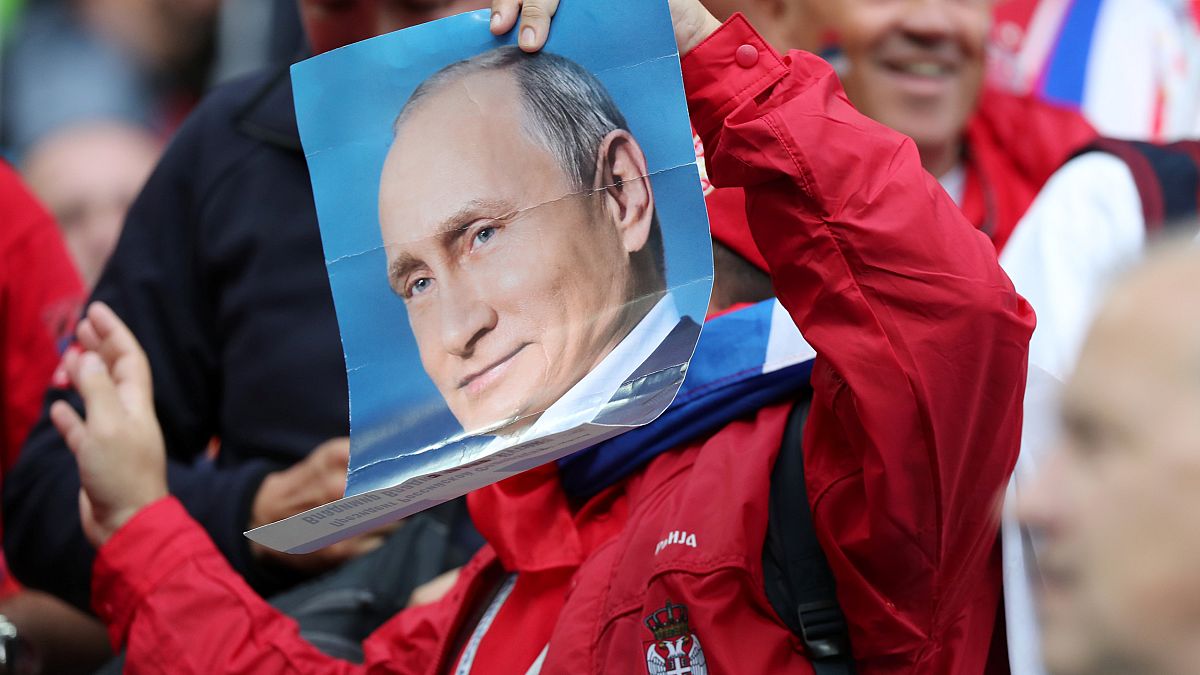How much can a bunch of guys kicking around a small ball boost a bruised and battered reputation like Russia’s? More than you think.
By Brett Bruen
Russia will win the World Cup. They won’t be able to sew a star on their jerseys or parade the trophy through the streets of Moscow. Yet, President Vladimir Putin will still celebrate. He knows an even bigger prize awaits: a return to respectability.
Ever since the Olympic flame was extinguished in Sochi, the Kremlin has tried to get the glow of sports glory back. Their decision to invade Crimea just after those games denied them the chance to bask in the success of hosting the world’s biggest sporting event. Billions spent to burnish a better image for the country were suddenly washed down the drain. Russia spent the past several years in the penalty box for its meddling in Ukraine, Syria, the United States, and most recently a brazen chemical attack in the United Kingdom.
Even the latest shocking developments in that case seem to have done little to dim a resplendent Russian star. Is the global prestige Putin has so long pursued now finally within his reach? Football’s biggest festival has focused the world’s gaze on a different side of the secretive state: glitzy graphics of gilded palaces gracing television screens; glowing commentary about the smooth, safe operations of the games; not to mention, getting to lavishly host dozens of ministers and monarchs.
It starts with the softer side. We seldom see beyond its seemingly stoic surface. The World Cup offered the chance to pull back the curtain on the traditional characterization of Russians as cold, calculating. We witnessed as their hopes were lifted and the tears came down.
These displays of emotion draw us closer. It becomes more difficult to define Russia purely in impersonal terms. We start to see their destructive deeds through a more familiar, forgiving lens. We want to believe their explanations, even their thinly veiled excuses. Replenishing the reservoirs of goodwill goes beyond humanizing its citizens.
Russia really wants you to feel. When you’re feeling, facts become less important. The World Cup is arguably the most emotional event collectively experienced around the globe. The games are long remembered. The shots replayed. The moments we shared watching, repeatedly recounted across bar counters.
The Kremlin will continue to conjure up those memories. In subtle and significant ways, they will seek to wrap it around their embassies, emissaries, and broader engagement with the world. Fortunately, they possess one of the planet’s most massive propaganda machines. We can expect it will churn out copious quantities of material on the topic. If I were working at the Foreign Ministry, a diplomatic cable would go out instructing ambassadors to start every meeting by asking, “What was your favorite part of Russia’s World Cup?”
Come one, come all. A taboo has been broken. Since its invasion of Crimea, Russia has been black listed from many major and minor global events. Hosting the World Cup makes it much more acceptable for other international conferences and events to now be held in the country. Even travel to the country will quickly become less controversial. So, be sure to book your Siberian getaway before prices go up…
There was someone we saw little of during the last several weeks. Vladimir Putin kept an unusually low profile. This isn’t by accident or for lack of a love of the game. I believe for all of the reasons I listed above, it was a strategic move. Without him prominently in the picture, the country can paint a warmer, more welcoming picture for the world.
Recently, he has gotten a boost from an unlikely source: American politicians. A delegation of Republican senators just came through town with talk of turning the page. President Trump is turning his next meeting with Putin into a full-blown summit. The event, heavy on splash, light on substance, is a format that ideally suits the Kremlin. What is ultimately accomplished is likely to favor Russia, with the United States softening its position on Moscow’s many mischievous activities.
So how much can a bunch of guys kicking around a small ball boost a bruised and battered reputation like Russia’s? More than you think. The World Cup comes at a time when Washington’s influence is waning. Trump has proven himself to be an erratic, destabilizing force. A recent survey showed that more Germans see America, not Russia, as a greater threat to world peace. Putin can use the success of the football games to portray himself as a capable counterweight.
Football is a nearly universal language. Human rights, democracy, and the rule of law can be harder for the average citizen to interpret. While many leaders around the globe may be unswayed by a successful sporting event, their voters are another story. The World Cup has likely earned Russia valuable currency with key working-class voters. They will undoubtedly try and leverage this influence to push for removing sanctions in the coming months.
I spent much of my time at the White House countering Russian propaganda. One could not help but marvel at their adept, deft defiance of gravity. Negative narratives transformed to their advantage. No matter how many facts are stacked against them, their massive misinformation machine grinds them into unrecognizable dust. Even in the most challenging of circumstances, they manage to insidiously infect ideals and institutions. A golden egg just landed in their lap. I fear their World Cup victory may be costly for many of our countries and core values.
Brett Bruen is president of the Global Situation Room, Inc., an international consulting firm. He serves as adjunct faculty member in crisis management at Georgetown University and on boards at Harvard University, University College Dublin, and UNICEF. Under President Obama, he was director of global engagement at the White House and spent 12 years as a U.S. diplomat.
Opinions expressed in View articles are not those of euronews.
